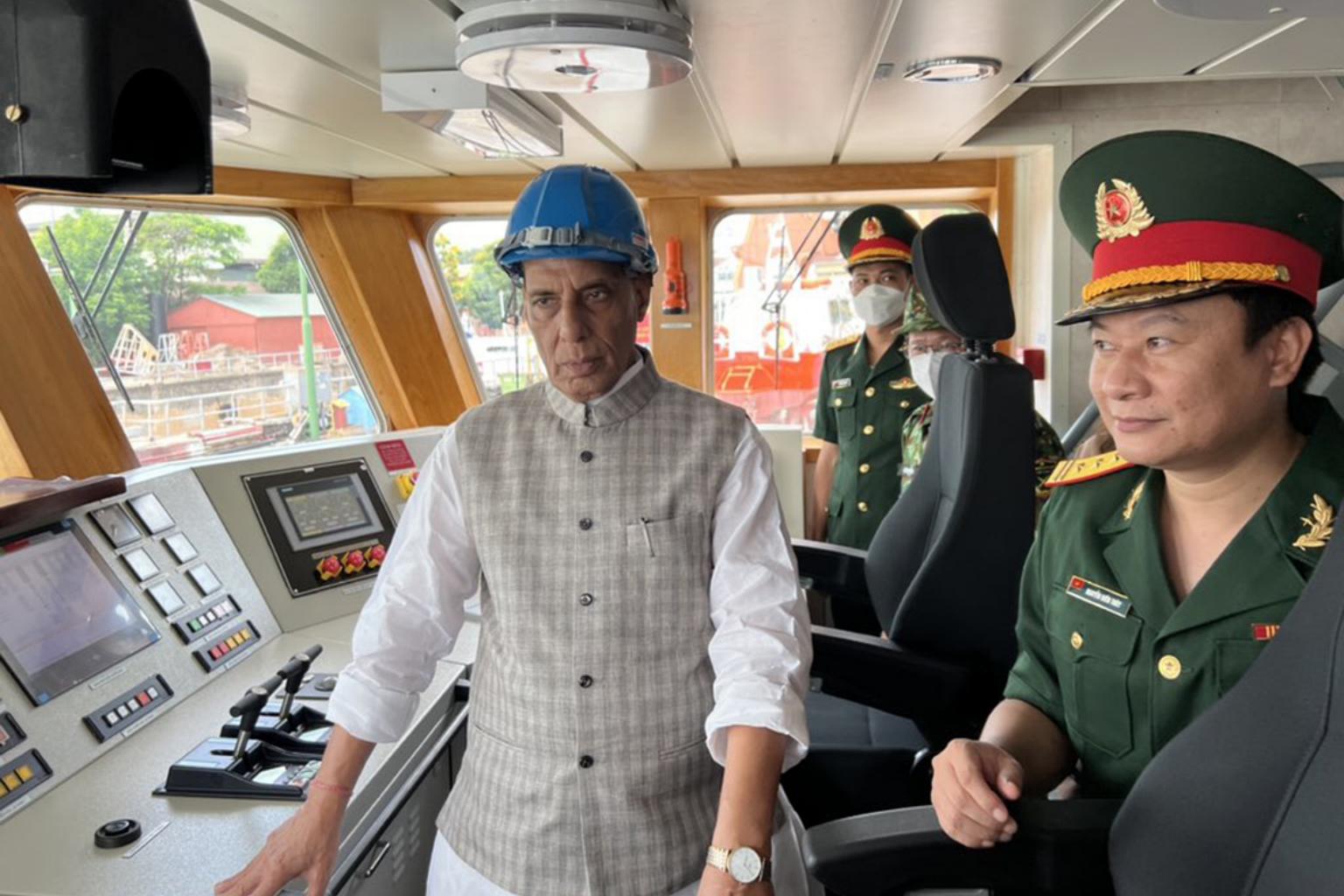India, Vietnam deepen defence ties as Delhi seeks to boost maritime presence in Indo-Pacific
Sign up now: Get insights on Asia's fast-moving developments

Indian Defence Minister Rajnath Singh at Hong Ha Shipyard in Vietnam to hand over 12 high-speed patrol boats.
PHOTO: RAJNATHSING/TWITTER
Follow topic:
NEW DELHI - India handed over 12 high-speed patrol boats to Vietnam on Thursday (June 9), a day after inking a mutual logistics agreement allowing the use of each others' military bases in a significant expansion of defence and security ties - all with an eye on China.
The two countries also signed a vision statement on defence ties till 2030.
The agreements come as India steps up its maritime presence in the Indo-Pacific and increases defence linkages with South-east Asia.
The patrol boats were built under a US$100 million (S$137.6 million) defence line of credit that India extended to Vietnam in 2014.
Five boats were manufactured in India and seven at Hong Ha Shipyard in Vietnam.
At the handover ceremony on Thursday, Indian Defence Minister Rajnath Singh said: "I'm confident that this will be a precursor to many more cooperative defence projects between India and Vietnam."
On Wednesday, the two countries signed a mutual logistical agreement - a first for Vietnam - that allows their militaries to use each other's bases for repair and replenishment of supplies.
The Indian Defence Ministry in a press release called the agreement a "major step towards simplifying procedures for mutually beneficial logistic support".
Mr Singh and his Vietnamese counterpart General Phan Van Giang also signed a Joint Vision Statement On India-Vietnam Defence Partnership Towards 2030, which India's Defence Ministry said "will significantly enhance the scope and scale of existing defence cooperation".
India in 2016 extended Vietnam a separate US$500 million line of credit to source or jointly manufacture defence weapons with India.
Vietnam is reportedly also looking to purchase India-made BrahMos medium-range supersonic cruise missiles.
India earlier this year sold the Philippines these missiles, which were jointly developed by India and Russia.
India and Vietnam have a deepening defence relationship, fuelled by common fears over the rising assertiveness of China.

India has border troubles with China which flared up in 2020 following a violent clash in which both sides lost soldiers in the Ladakh region. Two years on, the two countries are still working through disengagement.
Vietnam, on the other hand, has competing claims with China near the Paracel Islands and has in the past objected to Chinese military drills in the disputed area, accusing Beijing of advancing territorial claims during the pandemic.
Dr Rajeswari Pillai Rajagopalan from the Observer Research Foundation also noted that while the logistical agreement was Vietnam's first, India had been signing such agreements with many countries.
"I think it's important to see which countries India is signing these kinds of agreements with. One with Russia but other than that primarily with Indo-Pacific powers who remain wary of China, like Australia, Singapore, Japan and the United States. Now signing with Vietnam suggests that the China threat is large in our thinking."
She added: "The agreements will give India a firmer foothold in Vietnam. And India will find ways to continue improving the India-Vietnam relationship."
Vietnam, like many other South-east Asian countries, has sought deeper defence ties with India.
It has also been keen for India, as the other large Asian power, to have a larger presence in South-east Asia and in the South China Sea.
While India is unlikely to undertake a joint patrol with the US, for instance, Dr Rajagopalan noted that "inch by inch, very gradually", India was making changes in its approach to South-east Asia with greater defence engagement.
Former commander of the Indian Army's Northern Command D.S. Hooda said closer defence cooperation could help the two countries respond to any situation requiring joint military collaboration.
"(The agreement) helps in how countries can assist each other in promoting their defence capability in terms of training and sharing of logistics. Some ports of Vietnam would be able to provide support for the Indian navy and vice versa. If a situation arises then there will be know-how on how two navies can operate in support of each other," the retired lieutenant-general said.
Still, he noted that greater ties with Vietnam also indicated India's maritime ambitions.
"China already has a great deal of influence in South-east Asia but India would like to see its influence in this region increasing," he added.

